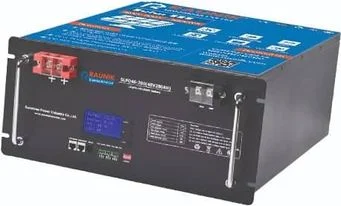Product Catalog
New Products
Lithium Battery for Energy Storage Systems
Lithium Battery for Energy Storage Systems: In the 1970s, Exxon chemist Stanley introduced the lithium-ion batteries concept, which Sony and Asahi Kasei accomplished in 1991 by presenting the commercial lithium-ion battery. As a result of the popularity of these Li-ion batteries, which were initially utilized for consumer electronics, numerous businesses are now creating cells that help in energy storage.
Lithium batteries are now used in the majority of storage systems all over the world. A wide range of technologies is used in lithium batteries to store energy utilizing lithium ions, which have a free +ve charge and are easily reactive with other elements.
Due to the advantages they offer users, such as time-shifting, higher power quality, greater network grid utilization, and urgent power supply, lithium-ion battery energy storage systems (BESS) are famous. We also supply all machines for Lithium battery Assembly & Testing like Cell Grading/Testing Machines, Battery Charge Discharge Machines , BMS Tester & Spot Welding Machines.
What Is a BESS?
A BESS is a set of rechargeable batteries that collects energy from the power grid or renewable energy sources and stores it for use later, as required. A BESS can use various battery types, although, by the end of 2019, lithium-ion batteries in the US accounted for more than 90% of large-scale battery storage power capacity.
Companies of all sizes and sorts, from energy utilities and big data centers to retail locations, workplaces, and schools, frequently use lithium-ion BESS in combination with solar panels and wind turbines. A BESS can be used in residential residences to store electricity from rooftop solar panels or grid-supplied emergency power.
Although these technologies have many advantages, they can also pose serious risks if unforeseen circumstances arise. When installing a BESS to your house or business’s electrical system, having a clear plan to mitigate the hazards is crucial. Also Check Best Lithium Battery for Solar Panels.
How Lithium-Ion Battery Energy Storage Work?
Lithium batteries, which consist of a positive terminal (the lithium cathode) and a negative terminal (the carbon anode), are charged and discharged through chemical processes that enable energy—in this case, energy produced by renewable plants—to be deposited and restored. The flexibility, high power density, and high charging / discharging efficacy of lithium batteries—which can surpass 90% on a single module level—are all very intriguing technological characteristics for energy applications.
Recent years have seen a technological change relying on nickel, manganese, and cobalt (NMC), with higher output and prices that, according to Bloomberg statistics, fell by roughly 85% between 2010 and 2018.
Benefits of Lithium Energy Storage Batteries
-
The battery energy storage system will spark a change in energy systems. The item is fueled by an internal energy management technology that Jackson has patented and can synchronize with different power sources.
-
It is intended to maximize renewable energy sources and optimize power utilization, lowering energy bills for our end users.
-
The BESS can be modified further to fulfill industrial, defense, healthcare, domestic, and other industrial needs. It starts with a 5KW range. It offers specialized power backup, minimizing business revenue loss from power outages.
-
It may be remotely inspected with data encryption logging and only needs a maximum of two hours of charging. Additionally, the enclosure fits with IEC requirements and offers IP-54-certified security. The product features an innovative internal EMS for maximum performance and reliability and does not need civil work.
Hazards of Lithium-Ion Battery
Even though lithium-ion battery systems have many advantages, they can nonetheless pose risks to where they are put. These risks include:
Chemical Hazard
An explosion may result from the leakage of chemicals from a battery throughout a fire. When combined with firefighting water, chemical emissions can potentially cause liquid pollution by polluting the land or groundwater. The chemical release is a problem for any battery power system, but it can be less of a problem for a BESS with lithium-ion batteries than with some other battery types.
Creating effective containment systems can aid in minimizing the harm caused by chemical leakage.
Standard Energy Hazard
Batteries can still hold energy after they are broken, and this “stranded” energy needs to be released before interacting with or removing the injured cells. Defective batteries may result in injury, particularly electrical shock, if improperly handled.
Fire Hazard
Thermal runaway, when a battery cell generates heat that it cannot efficiently disperse, frequently leads to fires in a BESS. A domino effect is produced by the resulting dynamic temperature rise in the cell and nearby cells. A battery cell may experience this behavior due to internal flaws, mechanical damage, and heat exhaustion from an outside source, overvoltage charging, failure, and problems with the battery management system.
Future of Lithium-Ion Battery
Researchers are testing novel formulations with reduced cobalt percentages or where lithium is coupled with other elements that are simpler to get, like silicon or even oxygen, because some components, particularly cobalt, are hard to acquire from a socio-political standpoint.
Additionally, final administration is receiving more attention through the research of procedures that enable us to “close” the production process by recycling the essential elements. The Global Battery Alliance estimates that 11 million tonnes of lithium-ion batteries will surpass their useful lives by 2030. To possibly include lithium batteries in the storage systems of renewable energy sources or to provide care for the electricity network, several lithium batteries reuses (such as for electric vehicles) are being researched. It will help to establish a circular economy.
check out our Lithium Batteries for Home Invetor Or you Are Also Bike Lover so this Best Lithium Battery for Bike Easy for your life
LEAVE A MESSAGE
If you are interested in our products and want to know more details,please leave a message here,we will reply you as soon as we can.


